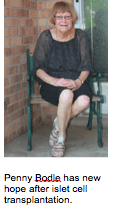
Nobody could have blamed Penny Bodle for losing her sense of humour during her 55-year journey managing type 1 diabetes.
Until recently, Penny was forced to arrange for a family member or friend to be with her day and night, as she had been prone to frequent episodes of severe hypoglycemia over the past 22 years. (Hypoglycemia occurs when blood glucose levels drop below 4.0 mmol/L.)
“I could never take my grandchildren for a walk around the block without taking a babysitter,” quipped Penny this past summer. She lives in Clinton, Ontario, with her husband Charlie
“You have to laugh about it, or life simply becomes unbearable,” she added.
In 2007, Penny participated in an experimental islet cell transplantation program. (Islets are tiny clusters of cells that produce the hormone insulin.) Islet cell transplants are performed in people with type 1 diabetes who experience frequent and severe episodes of hypoglycemia. The procedure involves removal of insulin-producing islet cells from a donor pancreas and placement of the cells into a person with type 1 diabetes. For Penny, the treatment could be potentially life-changing.
There was only one problem: at that time, the University of Alberta Clinical Islet Transplant Program in Edmonton was the only place in Canada that could perform an islet transplant. Multiple flights between Ontario and Alberta would be required for assessment, treatment and follow-up.
Fortunately, the Edmonton transplant team informed the Bodles about Hope Air. “Hope Air has been a godsend for us in our time of greatest need,” says Charlie, who retired recently.
Hope Air has since arranged several free flights each year for the couple as they take Penny’s organ transplant journey together. The organization provides free airfare for an escort, when medically required for an adult, and always for a child.
“Organ transplantation has many expensive obstacles to overcome, and Hope Air took care of one of the most crucial ones: travelling to Edmonton several times,” says Charlie. The couple may still need to travel to Alberta for follow-up, but Penny can now be monitored by doctors in London, Ontario, who were trained in Edmonton.
This procedure “is the best thing that can happen to a diabetes patient,” says Penny. She now looks forward to many more years of being a wonderful wife, mom and grandmother.
Starting in 2014, Hope Air gratefully acknowledges the generous support of Sun Life Financial to cover the cost of diabetes flights across Canada for patients like Penny Bodle. Learn more about the corporation’s commitment to the prevention of diabetes and its related complications at www.sunlife.ca.
For more information about Hope Air, to subscribe to a newsletter, or to request a flight, please visit the web site. You can also stay in touch by joining www.facebook.com/hopeair. The Client Care Call Centre can be reached toll free at 1.877.346.HOPE (4673). A friendly volunteer will answer any questions you may have about eligibility requirements and requesting a free flight.

